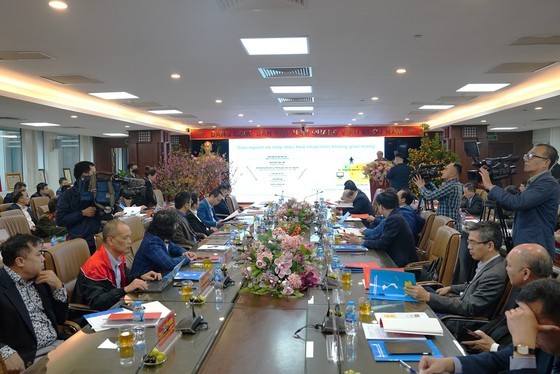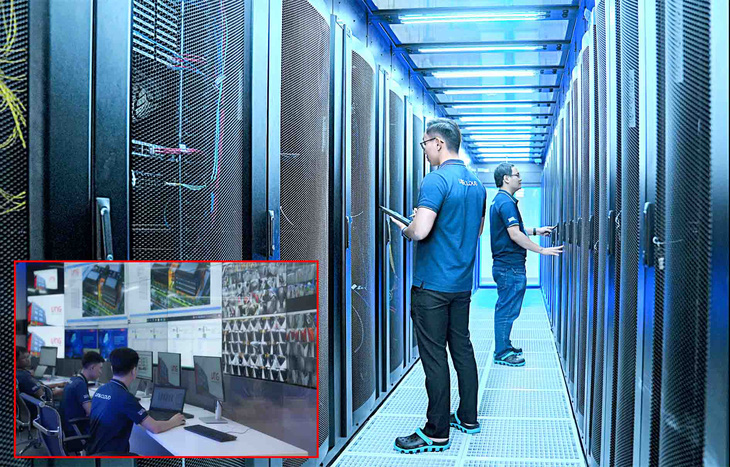Industrial park restructuring, viewed from Tan Thuan export processing zone
(KTSG) – Many people argue that it would be prudent not to bring up this matter until the land leasing period has passed. Since it was a preventative measure, it may not be too soon and entirely appropriate to evaluate it after years of use.

On the morning of June 28th, 2022, a workshop was held in District 7 with the theme “Development strategy of District 7 to 2030 and vision to 2045” organized by the District Party Committee of District 7 in collaboration with the Ho Chi Minh City Academy of Cadres. The workshop covered many issues, including what will be used after Tan Thuan EPZ expires after a 50-year land lease term.
Tan Thuan Export Processing Zone was established in 1991, so it will expire in 2041. From now on, there are 19 years left.
In Vietnam, industrial parks and export processing zones first appeared in Ho Chi Minh City. The earliest export processing zone was Tan Thuan Export Processing Zone (1991), leased by a Taiwanese economic group. This is also the construction group of Phu My Hung residential area, Nguyen Van Linh street, and Hiep Phuoc industrial park.
From 1991 to the end of September 2021, nationwide, there are 563 industrial parks in the planning for the development of industrial parks in Vietnam with a total natural land area of about 210,900 hectares, of which 397 zones has been established with a total natural land area of about 122,900 hectares.
Urban restructuring based on recovering industrial parks after the lease term has expired has taken place in countries/territories that industrialized 20 years before Vietnam. They see this as an opportunity to correct deficiencies in the process of planning and strategic development in a region or a city.
These industrial zones lease (land use rights) land for a term of 30, 50 years from the State of Vietnam (public land) or the private sector. Most of these industrial zones must be generally large. There are areas of nearly 2,000 hectares (such as Becamex Binh Duong industrial park). And most of them are located in prime locations such as near the national highway, near the port, near the river, and the sea which was previously considered as rich and beneficial land.
Over time, more than 500 of these industrial parks will in turn expire. The Vietnamese state must calculate a rational reuse strategy. Therefore, the plan to reuse Tan Thuan EPZ is considered very important because it is the first rental unit to expire, and thus becomes the first case for the whole country to learn and learn from.
Ho Chi Minh City currently has 23 industrial and export processing zones, but because it is a pioneer in the whole country, it has no experience and encounters limitations. For example, investors rent an area that is too large compared to actual requirements, and the rent is cheap (about VND 40,000/square meter/month, term of 50 years). There are industrial parks with too small an area, too outdated production technology, too labor intensive, and in the wrong location such as close to traffic roads causing congestion, located right in residential areas, so it affects people’s lives. residential living.
Therefore, when industrial parks expire, it is an opportunity for localities to adjust their industrial development strategies. Depending on the situation, it can be extended for another 20 years (each time) and terminated for another purpose.
Back to the story of the Tan Thuan export processing zone. Tan Thuan Export Processing Zone has a very large area of 300 hectares, located right next to the modern urban area Phu My Hung, next to the Saigon River, with a convenient location both by waterway and by road. Currently, some opinions are offering several different options after the Tan Thuan export processing zone is withdrawn, which can be summarized as follows:
The first option is to turn this land into a complex urban area like Phu My Hung. This option is convenient because it will be an expanded model of Phu My Hung. In the situation that the city is lacking commercial land, it is possible to create an additional urban area with high-quality service, hotel, and commercial functions, as “logistics” for the financial center of Thu Thiem. meaningful. But this option has a point to consider that it will increase the population of Ho Chi Minh City, and increase an upstream area, but does not contribute to helping to remove the bottlenecks of Ho Chi Minh City in terms of housing, trees, and schools.
The second option is to turn this place into a green park combined with high-end entertainment services like Singapore’s Sentosa, including a third of the area for a large square in Ho Chi Minh City. This option has a positive side that solves the shortcomings of Ho Chi Minh City such as the lack of trees, lack of squares, and lack of places to play for city people on weekends and holidays. But the large square located outside the central area is difficult to hold large events, while the 21-hectare Thu Thiem square is still in the construction plan.
The third option is to keep it as an industrial park but in a new direction of development. In Ho Chi Minh City, there are currently 23 industrial parks and export processing zones, distributed too scattered. If you look at the map, you will see that these 23 zones are scattered over the area of 12/24 districts. Many districts have too many industrial zones interwoven, so it is difficult to plan space and socio-economic planning which directly affect people’s lives. Therefore, on this occasion, the city needs to consider the plan to bring some industrial zones to the Tan Thuan export processing zone.
Which industrial parks can be collected for the Tan Thuan export processing zone? Those are industrial parks with an area that is too small with only 25-27 hectares, those that are located in the wrong place, causing serious harm to traffic such as Tan Binh industrial park, industrial parks that produce various items. hazardous goods such as chemicals, textiles, dyes, and rubber but with outdated technology are located in the population. If doing so, will bring a lot of benefits, which is to bring industrial zones to the perimeter outside the central area and residential areas; concentrated in a place that is easy to manage, can carry out the centralized treatment of waste and waste, establish a dedicated traffic route for the industrial park; having land for social housing and accommodation for workers is very convenient, and the land after recovering the inner city industrial zones will be used for public works that HCMC is very lacking such as green parks, schools, amusement parks for children and the elderly.
In his speech at the “Vietnam Urban Sustainable Development Forum” on June 17th, 2022, Deputy Prime Minister Le Van Thanh said, “Resolutely not to sacrifice welfare works to develop commercial and residential areas. life”. It is a fact that after more than 30 years of urbanization, Vietnamese cities have developed very quickly with apartments, office buildings, hotels, and urban areas, but very few public works such as kindergartens, primary schools, high schools, parks, flower gardens, playgrounds, squares. Many people believe that on the occasion of the large-scale acquisition of public land by cities such as industrial parks, export processing zones, old factories, warehouses, and relocation of offices outside, the implementation of the Deputy Prime Minister’s director general is possible.
Urban restructuring based on recovering industrial parks after the lease term has expired has taken place in countries/territories that industrialized 20 years before Vietnam such as Korea, Malaysia, Taiwan… They have successfully implemented and considered this as an opportunity to correct deficiencies in the process of planning and strategic development in a region or a city.
Source: KinhteSaigon




